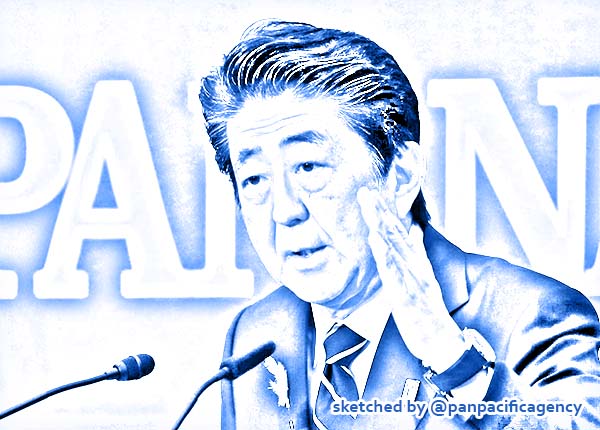Japan announces basic policy to fight spread of coronavirus

Japan's Prime Minister Shinzo Abe speaks at a debate session ahead of July 21 upper house election at the Japan National Press Club in Tokyo on Wednesday. Photo: REUTERS/Issei Kato. Sketched by the Pan Pacific Agency.
TOKYO, Feb 25, 2020, Kyodo. The Japanese government on Tuesday announced a basic policy to cope with a further spread of the new coronavirus that would put a strain on its medical system, calling for a more efficient use of hospitals to better treat infected people with serious symptoms, Japan Today reported.
With a gradual increase in confirmed cases in various parts of the country besides hundreds who were quarantined on a cruise ship near Tokyo, Japan is shifting its focus to preempt a spike in infections and resulting deaths.
The government maintains there are small groups or “clusters” of infections but that Japan has not seen a large-scale epidemic.
“It is extremely important to slow down the pace of increase in the number of infected people if we are to contain an epidemic in the country,” the basic policy said.
A government panel of medical experts has said the next week or two will be a “critical” period to determine whether the virus will spread further or not.
Japan has confirmed over 850 infections, with most of them from the Diamond Princess cruise ship, which was docked in Yokohama. But the emergence of cases in which infection routes remain unknown has raised caution among health authorities and the public and in recent days school-age children have tested positive for the virus.
If a further rise in infections can be prevented or delayed, this will give healthcare providers more time to make necessary preparations to treat infected patients, the experts said.
In the policy adopted at a meeting of a government task force on coronavirus, hospitals other than those specialized in infectious diseases will be allowed to accept patients suspected of having the virus in areas where infections surge.
But such hospitals are required to take necessary steps to prevent the spread of infections, such as setting different consultation hours for patients suspected of having the virus.
In the meantime, local authorities are urged to decide which medical institutions should be given priority in sending infected people with severe symptoms.
Prime Minister Shinzo Abe said Japan should prepare for a scenario in which infections jump, adding that it is a pressing issue to make sure infected people, especially those with severe conditions, can receive adequate medical care when needed.
“We will work closely with local governments and medical institutions to have a solid system in place to provide medical care,” Abe told the task force meeting at the prime minister’s office.
The outbreak of the pneumonia-causing virus that originated in China has spread to nearly 30 countries.
Japan is battling to contain the disease called COVID-19, asking its citizens to stay indoors and refrain from going to school or work if they have cold-like symptoms.
Companies have been urged to promote teleworking and allow employees to commute earlier or later than usual to avoid packed rush-hour trains that raise the risk of infection.
Before going to a hospital, people have been advised to first contact local healthcare centers if they develop a fever of 37.5 C or higher for at least four days. The period is shortened to two days for the elderly, those with chronic diseases, and pregnant women.
Some people do not exhibit symptoms of COVID-19 such as fever and coughing despite having contracted the virus, while the elderly and those with underlying illnesses are at a higher risk of their symptoms worsening.
Experts have warned that virus-laden droplets produced by sneezing and coughing increase transmission risks.
In the run-up to the Tokyo Olympics and Paralympics this summer, Japan is being tested on its ability to contain the virus as its handling of the quarantined Diamond Princess has come under international scrutiny.
The viral outbreak has prompted sports and other events to be canceled or postponed.